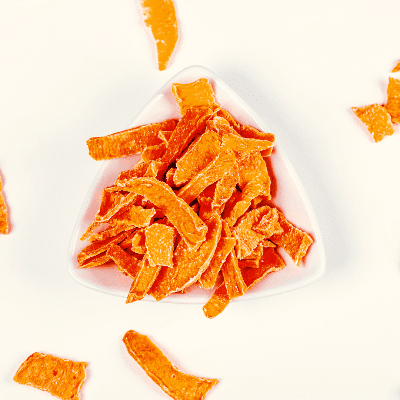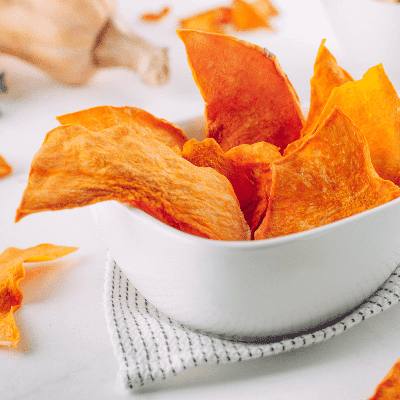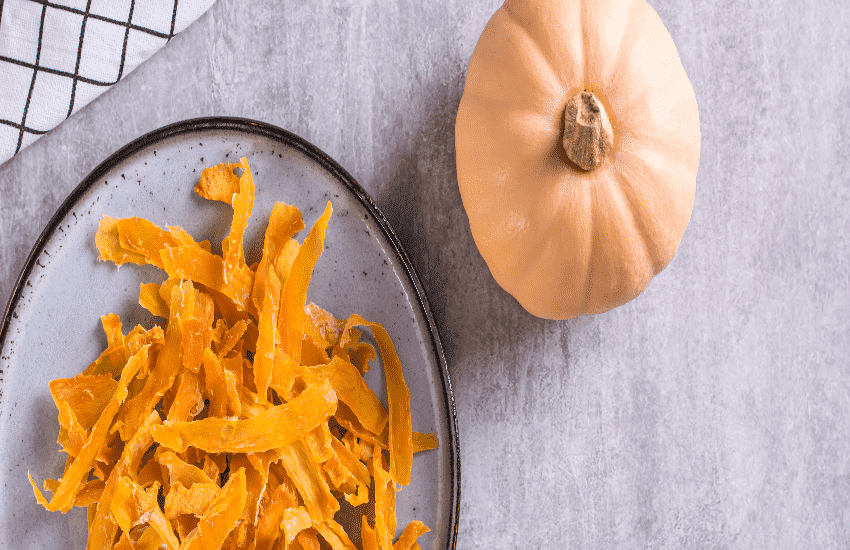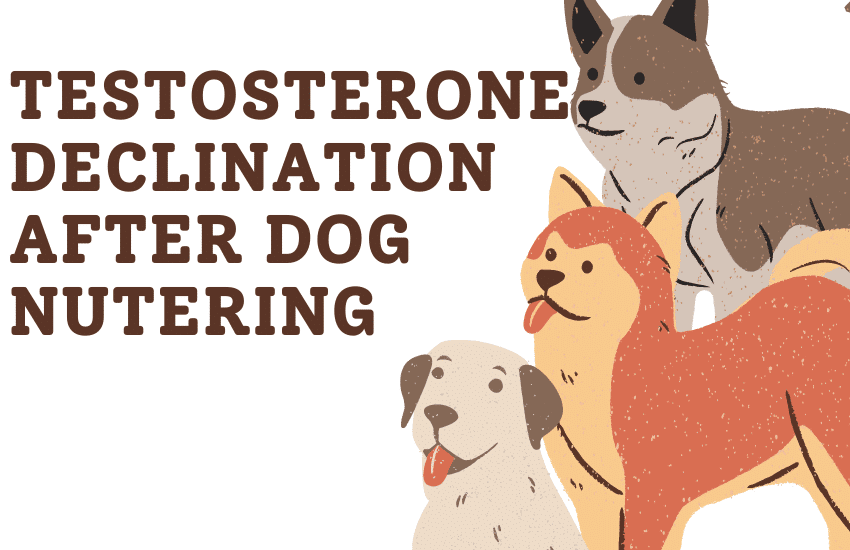Dehydrated pumpkin for dogs have quickly become an effective and popular addition to many canine diets, providing both delicious treats and numerous health benefits for our dogs. In this post, we’ll look at all of the advantages associated with providing dehydrated pumpkins as treats at home, in comparison with commercial options as well as any potential adverse side effects.
Why dehydrated pumpkin for dogs
Choosing dehydrated pumpkin for dogs over other types of pumpkin options offers several benefits. Here are some reasons why dehydrated pumpkin may be a preferred choice for your furry friend:
Convenience: Dehydrated pumpkin is lightweight, easy to store, and has a longer shelf life compared to fresh pumpkin. This makes it a convenient option for pet owners who want to provide their dogs with the nutritional benefits of pumpkin without the hassle of preparing and storing fresh pumpkins.
Consistency: Dehydrated pumpkin treats provide a consistent texture and flavour, making it easier to incorporate into your dog’s diet. This can be especially helpful for picky eaters or dogs with specific dietary preferences.
Nutritional Value: Dehydrated pumpkin retains most of its nutritional value, including essential vitamins, minerals, and fibre. By choosing dehydrated pumpkin treats, you can ensure that your dog receives all the health benefits that pumpkin has to offer.
Digestibility: Dehydrated pumpkin is easier for dogs to digest compared to raw pumpkin or pumpkin seeds. The dehydration process helps break down the pumpkin’s fibres, making it more gentle on your dog’s digestive system.
In a study published in the National Institutes of Health (NIH), researchers found that pumpkin can help improve digestive health in dogs by promoting regular bowel movements and aiding in the treatment of constipation. The dehydration process preserves these digestive benefits, making dehydrated pumpkin a valuable addition to a dog’s diet.
Versatility: Dehydrated pumpkin can be used in a variety of ways, including as a standalone treat, as an ingredient in homemade dog treats, or as a supplement to your dog’s regular meals. This versatility allows you to incorporate pumpkin into your dog’s diet in different ways to keep things interesting.

Possible adverse reactions associated with feeding dried pumpkins to dogs:
While dried pumpkins are generally safe and beneficial for dogs, there are some possible adverse reactions that may occur if fed in excessive amounts or if your dog has a specific sensitivity or allergy to pumpkins. Here are some potential adverse reactions associated with feeding dried pumpkins to dogs:
Digestive Issues: Dogs that consume large amounts of dried pumpkins may experience digestive issues such as diarrhea, gas, or bloating.
The American Kennel Club (AKC) recommends introducing new foods, including dehydrated pumpkin, gradually into a dog’s diet to monitor for any adverse reactions or digestive issues
Allergic Reactions: Some dogs may have allergies to pumpkins, which can manifest as itching, skin irritation, or gastrointestinal upset. If your dog shows any signs of an allergic reaction after consuming dried pumpkin, discontinue use and consult your veterinarian.
Intestinal Blockages: The seeds of pumpkins can be a choking hazard or cause intestinal blockages in dogs if consumed in large quantities. It’s important to remove the seeds and pulp before feeding dried pumpkin to your dog to prevent any potential issues.
Weight Gain: Dried pumpkins are rich in fibre and nutrients, which can be beneficial in moderation. However, excessive consumption of dried pumpkin treats can lead to weight gain in dogs, especially if they are already overweight or have a sedentary lifestyle.
Blood Sugar Spikes: Pumpkins are relatively high in natural sugars, which can cause blood sugar spikes in dogs, especially those with diabetes or insulin resistance. Monitor your dog’s blood sugar levels closely when introducing dried pumpkin into their diet.
To minimize the risk of adverse reactions, it’s important to feed dried pumpkins to your dog in moderation and consult with your veterinarian before making any significant changes to their diet.
Always monitor your dog for any signs of discomfort or adverse reactions after feeding dried pumpkin treats, and adjust their intake accordingly. By being mindful of your dog’s individual needs and sensitivities, you can safely incorporate dried pumpkins into their diet as a healthy and tasty treat.
How to dehydrate pumpkin for dogs at home
Making dehydrated pumpkin at home is a simple and nutritious way to provide your dog with a tasty and healthy treat. Here is a step-by-step guide on how to make dehydrated pumpkin at home, along with some nutrition facts:
Ingredients:
Fresh pumpkins
Knife
Spoon
Dehydrator
Baking sheet
Parchment paper
Step 1: Select ripe and firm pumpkins for the best flavor and nutritional value. Wash and dry the pumpkins thoroughly.
Step 2: Preheat your dehydrator according to the manufacturer’s instructions.
Step 3: Cut the pumpkins in half and remove the seeds and stringy pulp using a spoon. You can set aside the seeds for roasting if desired.
Step 4: Slice the pumpkin halves into thin, uniform slices. You can also peel the pumpkin if desired, although the skin is nutritious and can be left on.
Step 5: Arrange the pumpkin slices in a single layer on a baking sheet lined with parchment paper.
Step 6: Place the baking sheet in the dehydrator and set the temperature to around 125°F (51°C). Let the pumpkin slices dehydrate for 6-12 hours, or until they are completely dry and crispy.
Step 7: Once the pumpkin slices are fully dehydrated, remove them from the dehydrator and allow them to cool completely.
Step 8: Store the dehydrated pumpkin slices in an airtight container or resealable bag at room temperature for up to several weeks. You can also freeze them for longer storage.
Nutrition Facts:
Dehydrated pumpkin retains most of its nutritional value, including essential vitamins, minerals, and fibre. One cup of dehydrated pumpkin slices may contain approximately:
Calories: 49
Protein: 1 g
Carbohydrates: 12 g
Fibre: 5 g
Vitamin A: 145% of the daily value
Vitamin C: 16% of the daily value
Potassium: 394 mg
Iron: 1.4 mg
By following this simple step-by-step guide, you can make nutritious and delicious dried pumpkin dog treats at home. These treats are a great way to introduce pumpkin into your dog’s diet and provide them with all the health benefits that this super-food has to offer.

Alternative ways for adding pumpkin into your dog’s diet
If dehydrated pumpkin is unavailable to you, there are still ways of including it into the diet of your pet. Canned pureed pumpkin can make an excellent alternative, while fresh pumpkin that has been cooked and mashed is also suitable. Furthermore, roasting the seeds before baking as treats for your dog could make an interesting treat!
Using pumpkin powder with dehydrated pumpkin for dogs
you can use pumpkin powder along with dehydrated pumpkin for your dog. Pumpkin powder is a convenient option that can be easily mixed into your dog’s food or treats for added nutritional benefits. To use pumpkin powder, simply sprinkle it over your dog’s meals or mix it into homemade treats for an extra boost of fibre, vitamins, and minerals. Be sure to follow the recommended serving sizes based on your dog’s weight and dietary needs.
How to store dehydrated pumpkin for dogs
Dehydrated pumpkin can last for a long time if stored properly. To ensure that your dehydrated pumpkin maintains its freshness and quality, it should be stored in an airtight container in a cool, dry place away from direct sunlight. Properly stored dehydrated pumpkin can last for several months to a year. It is important to check for any signs of spoilage, such as mold or off-putting odors, before feeding it to your dog.
Additionally, if you have made dehydrated pumpkin at home, you can extend its shelf life by vacuum-sealing the treats or storing them in the freezer. This will help preserve their freshness and nutritional value for even longer periods. By following these storage tips, you can ensure that your dehydrated pumpkin remains safe and enjoyable for your dog to eat.
Use of a desiccant bag containing silica gel will absorb any excess moisture and help ensure a more evenly dehydrated pumpkin.
Dehydrating pumpkins requires preventing any accumulation when stored; for optimal dehydration results, pumpkin should appear fresh without moisture accumulation.
What are the best pumpkin types for dehydrating?
When selecting pumpkins for your dog, it’s important to choose varieties that offer the best flavour and nutrition. Here are some of the best pumpkins to use for your furry friend:
Sugar Pie Pumpkin: Sugar pie pumpkins are known for their sweet and flavourful flesh, making them a great choice for dehydrated pumpkin treats. They are also rich in vitamins A and C, as well as fibre, making them a nutritious option for your dog.
Long Island Cheese Pumpkin: This variety has a creamy texture and a slightly sweet flavour, making it a favourite for homemade pumpkin puree. Long Island cheese pumpkins are high in vitamins and minerals, including potassium and iron, which can benefit your dog’s overall health.
Jarrahdale Pumpkin: Jarrahdale pumpkins have a unique blue-gray skin and a sweet, nutty flavor. They are packed with essential nutrients like vitamin A, fiber, and antioxidants, making them a healthy choice for your dog’s diet.
Cinderella Pumpkin: Also known as Rouge vif d’Etampes, Cinderella pumpkins boast a vibrant orange color and a subtly sweet taste. They are a good source of vitamins A and C, as well as fiber, making them a nutritious addition to homemade dehydrated pumpkin treats for your dog.
Fairytale Pumpkin: Fairytale pumpkins are a versatile option with a dense and smooth texture. They offer a rich, sweet flavor that is appealing to dogs and humans alike. These pumpkins are rich in antioxidants, vitamins, and minerals, making them a nutritious choice for your dog’s diet.
Baby Pam pumpkins: Baby Pam pumpkins are a smaller and sweeter variety of pumpkin that can also be a great option for your dog. These pumpkins have a smooth, creamy texture and a sweet flavour that dogs may find appealing. They are also easy to handle and prepare, making them a convenient choice for making dehydrated pumpkin treats at home.
When choosing pumpkins for your dog, go for organic varieties when possible to minimize exposure to pesticides and chemicals. Remember to remove the seeds and pulp before dehydrating or serving the pumpkin to your dog to avoid any potential choking hazards.
Customer Reviews of Products with Dehydrated Pumpkin for dogs:
Many pet owners reported positive experiences using dehydrated pumpkin products for their pets. Many often recommend dehydrated pumpkin products for better digestibility, healthier coats and higher energy levels in dogs. Check reviews from other owners with similar pets to identify which option will be the most suitable choice for you and your dog!
Considerations when selecting commercially dehydrated pumpkins for dogs
When choosing commercially dehydrated pumpkin products for your dog, there are several important considerations to keep in mind to ensure you are providing your furry friend with the best quality and safest option. Here are some key factors to consider:
Ingredients: It’s essential to carefully examine the ingredients list of any commercially dehydrated pumpkin product you are considering for your dog. Look for options that are made from 100% pure pumpkin without any added sugars, preservatives, or artificial additives. Avoid products that contain any harmful ingredients that could potentially be harmful to your dog’s health.
Source of Pumpkin: Consider the source of the pumpkin used in the dehydrated product. Organic pumpkins are generally a better option as they are grown without the use of synthetic pesticides or chemicals. Organically grown pumpkins are less likely to contain harmful residues that could be detrimental to your dog’s health.
Processing Methods: Look for dehydrated pumpkin products that have been processed using safe and gentle methods to retain the maximum nutritional value of the pumpkin. Avoid products that have been heavily processed or treated with chemicals that could diminish the health benefits of the pumpkin.
Nutritional Value: Check the nutritional content of the commercially dehydrated pumpkin product to ensure it provides your dog with the essential vitamins, minerals, and fiber they need for optimal health. Look for products that are rich in nutrients like vitamin A, vitamin C, fiber, and potassium, which are all beneficial for your dog’s well-being.
Serving Size and Portion Control: Consider the recommended serving sizes provided on the packaging of the dehydrated pumpkin product. Follow the guidelines based on your dog’s size, weight, and dietary needs to prevent overfeeding or underfeeding. It’s crucial to offer the right amount of dehydrated pumpkin to avoid any potential digestive issues or health complications.
Customer Reviews and Recommendations: Before purchasing a commercially dehydrated pumpkin product for your dog, take the time to read customer reviews and recommendations. Feedback from other pet owners can provide valuable insights into the quality, taste, and efficacy of the product. Look for products with positive reviews and high ratings to ensure you are selecting a reputable option for your dog.
Dehydrated pumpkin can be an economical and flexible way to supplement their pet’s diet, from digestive benefits to its high nutrient levels, dehydrated pumpkin is an ideal addition for pet owners seeking to enhance their pet’s well-being and health. Making it yourself or purchasing it from stores, dehydrated pumpkin can add both aesthetic appeal and nutritional benefits when feeding it to your dog. Think about making some for a tasty yet nutritious snack option!







